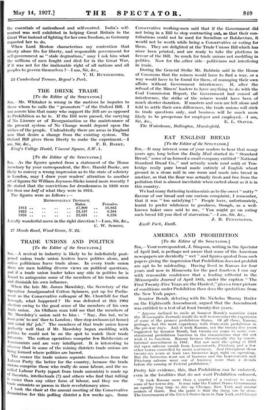TRADE UNIONS AND POLITICS
[To the Editor of the SPECTATOR.]
Spa,—A revival in industry is likely to be indefinitely post- poned unless trade union leaders leave politics alone, and unless politicians leave trade alone. In every trade union there are men holding diverse views on political questions, and if a trade union leader takes any side in politics he is bound to antagonize some of the members of his trade union and diminish his own influence.
When the late Mr. James Mawdsley, the Secretary of the Operative Amalgamated Cotton Spinners, put up for Parlia- ment as the Conservative colleague of Mr. Churchill for that borough, what happened ? He was defeated at this 1902 election owing to the good sense of the members of his own trade union. An Oldham man told me that the members of Mr. Mawdsley's union said to him : " Nay, Jim lad, we're noan goin' to sen' thee to London ; thee stop awhoam (at home) and mind thi' job." The members of that trade union knew perfectly well that if Mr. Mawdsley began meddling with Polities he could not be on the spot to watch their trade interests. The cotton operatives comprise few Bolshevists or Communists and are very intelligent. It is interesting to observe that in some of the mining districts trade unions are being formed where politics are barred.
The sooner the trade unions separate themselves from the Labour Party the better for the country, because the trade unions comprise those who really do some labour, and the so- called Labour Party (apart from trade unionists) is made up of theorists, intellectuals (?) and others who find that talking is easier than any other form of labour, and they use the trade unionists as pawns in their revolutionary aims.
took the chair at the annual meeting of the Conservative Association for this polling district a few weeks ago. Some
Conservative working-men said that if the Government did not bring in a Bill to stop contracting out, so that their con- tributions could not be used for Socialism or Bolshevism, it would not be worth while being a Conservative or voting for them. They are delighted at the Trade Unions Bill which has since been printed, and are ready to take the platform in favour of the Bill. So much for trade unions not meddling in politics. Now for the .other side—politicians not interfering in trade.
During the General Strike Mr. Baldwin said in the House of Commons that the miners would have to find a way, or a way would have to be found for them, of managing their own affairs without Government interference. If, after the refusal of the Miners' leaders to have anything to do with the Coal Commission Report, the Government had ceased all interference, the strike of the miners would have been of much shorter duration. If masters and men are left alone and told to settle their own differences, the trade unions will stick to trade questions only, and business will be much more likely to be prosperous for employer and employed.—I am,


























































 Previous page
Previous page